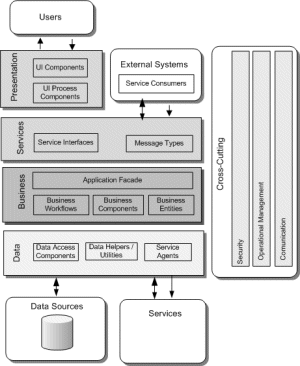Services Layer
In my previous posts I showed layers and components, and layers and tiers. In this post, I'll show the services layer in a layered architecture.
Services Layer
Here's a visual example of a services layer, where the application is exposing services:
Note that services don't need to be "web" services.
Key Services Layer Components
Here's the key components of a services layer:
- Service Interfaces. The service interface acts as a facade that exposes the business logic to potential consumers. The definition of the set of messages that must be exchanged with a service in order for the service to perform a specific business task is the contract.
- Message Types. Message Types are “message contracts” for communication between service consumers and providers. They wrap business entity components into specific messages for the calling service.
Additional Resources
- Designing the Components of an Application or Service (App Arch Guide)
- Architecture (Web Service Software Factory: Modeling Edition)
My Related Posts
patterns & practices App Arch Guide 2.0 Project
Scenario Frames for Presentation, Business, Data and Services
Comments
Anonymous
September 07, 2008
As part of our patterns & practices App Arch Guide 2.0 Project , I'm scanning Microsoft for helpfulAnonymous
September 10, 2008
So my question, in this diagram are you trying to show that layering is done in a strict way with no communication with the business layer other than through the service layer and then application facade?Anonymous
September 11, 2008
One of my colleagues on the patterns & practices team, David Hill , collected and distilled feedbackAnonymous
September 17, 2008
As part of our patterns & practices App Arch Guide 2.0 project , we've created a set of applicationAnonymous
September 24, 2008
As part of our patterns & practices App Arch Guide 2.0 project , we've put together an arch frame. Anonymous
November 11, 2008
Application Architecture Guidance Communiqué: Issue 1 About the Application Architecture Guidance 2.0Anonymous
November 20, 2008
The comment has been removed
